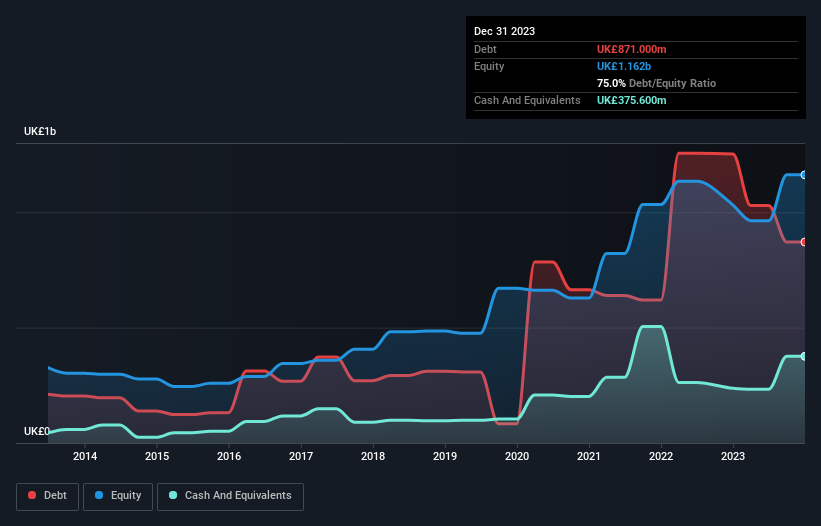The external fund manager backed by Berkshire Hathaway's Charlie Munger, Li Lu, makes no bones about it when he says 'The biggest investment risk is not the volatility of prices, but whether you will suffer a permanent loss of capital.' It's only natural to consider a company's balance sheet when you examine how risky it is, since debt is often involved when a business collapses. Importantly, Synthomer plc (LON:SYNT) does carry debt. But the real question is whether this debt is making the company risky.
Why Does Debt Bring Risk?
Debt is a tool to help businesses grow, but if a business is incapable of paying off its lenders, then it exists at their mercy. Part and parcel of capitalism is the process of 'creative destruction' where failed businesses are mercilessly liquidated by their bankers. While that is not too common, we often do see indebted companies permanently diluting shareholders because lenders force them to raise capital at a distressed price. Of course, debt can be an important tool in businesses, particularly capital heavy businesses. When we think about a company's use of debt, we first look at cash and debt together.
Check out our latest analysis for Synthomer
What Is Synthomer's Net Debt?
As you can see below, Synthomer had UK£871.0m of debt at December 2023, down from UK£1.25b a year prior. On the flip side, it has UK£375.6m in cash leading to net debt of about UK£495.4m.

How Strong Is Synthomer's Balance Sheet?
Zooming in on the latest balance sheet data, we can see that Synthomer had liabilities of UK£488.1m due within 12 months and liabilities of UK£1.06b due beyond that. Offsetting this, it had UK£375.6m in cash and UK£216.2m in receivables that were due within 12 months. So it has liabilities totalling UK£952.9m more than its cash and near-term receivables, combined.
This deficit casts a shadow over the UK£430.2m company, like a colossus towering over mere mortals. So we definitely think shareholders need to watch this one closely. After all, Synthomer would likely require a major re-capitalisation if it had to pay its creditors today. There's no doubt that we learn most about debt from the balance sheet. But it is future earnings, more than anything, that will determine Synthomer's ability to maintain a healthy balance sheet going forward. So if you want to see what the professionals think, you might find this free report on analyst profit forecasts to be interesting.
Over 12 months, Synthomer made a loss at the EBIT level, and saw its revenue drop to UK£2.0b, which is a fall of 15%. That's not what we would hope to see.
Caveat Emptor
Not only did Synthomer's revenue slip over the last twelve months, but it also produced negative earnings before interest and tax (EBIT). Indeed, it lost UK£16m at the EBIT level. Considering that alongside the liabilities mentioned above make us nervous about the company. We'd want to see some strong near-term improvements before getting too interested in the stock. It's fair to say the loss of UK£103m didn't encourage us either; we'd like to see a profit. In the meantime, we consider the stock to be risky. When analysing debt levels, the balance sheet is the obvious place to start. But ultimately, every company can contain risks that exist outside of the balance sheet. These risks can be hard to spot. Every company has them, and we've spotted 3 warning signs for Synthomer (of which 2 are significant!) you should know about.
If, after all that, you're more interested in a fast growing company with a rock-solid balance sheet, then check out our list of net cash growth stocks without delay.
New: Manage All Your Stock Portfolios in One Place
We've created the ultimate portfolio companion for stock investors, and it's free.
• Connect an unlimited number of Portfolios and see your total in one currency
• Be alerted to new Warning Signs or Risks via email or mobile
• Track the Fair Value of your stocks
Have feedback on this article? Concerned about the content? Get in touch with us directly. Alternatively, email editorial-team (at) simplywallst.com.
This article by Simply Wall St is general in nature. We provide commentary based on historical data and analyst forecasts only using an unbiased methodology and our articles are not intended to be financial advice. It does not constitute a recommendation to buy or sell any stock, and does not take account of your objectives, or your financial situation. We aim to bring you long-term focused analysis driven by fundamental data. Note that our analysis may not factor in the latest price-sensitive company announcements or qualitative material. Simply Wall St has no position in any stocks mentioned.
Have feedback on this article? Concerned about the content? Get in touch with us directly. Alternatively, email editorial-team@simplywallst.com
About LSE:SYNT
Synthomer
Manufactures and supplies specialised polymers and ingredients for coatings, construction, adhesives, and health and protection sectors.
Undervalued with imperfect balance sheet.
Similar Companies
Market Insights
Community Narratives



